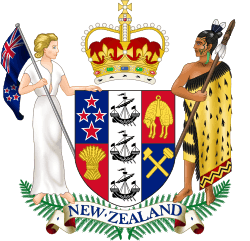High Court of New Zealand
The High Court of New Zealand is a superior court established in 1841.[1] It was originally called the 'Supreme Court of New Zealand', but was renamed in 1980[2] to make way for the naming of a new Supreme Court of New Zealand,[3] which first met in 2004.
The High Court has general jurisdiction and responsibility, under the Senior Courts Act 2016, as well as the High Court Rules 2016, for the administration of justice throughout New Zealand. Jurisdiction extends over both criminal and civil matters, and deals with cases at first instance or on appeal from other courts and certain tribunals.
Composition and locations
The High Court comprises the Chief Justice of New Zealand (who is head of the Judiciary) and up to 55 other Judges (which includes the Judges of the Supreme Court and Court of Appeal). The administrative head of the court is known as the Chief High Court Judge. Associate Judges of the High Court (formerly known as Masters) supervise the Court's preliminary processes in most civil proceedings, and have jurisdiction to deal with summary judgment applications, company liquidations, bankruptcy proceedings, and some other types of civil proceedings.
The High Court Judges and Associate Judges are based in Auckland, Wellington and Christchurch, but also travel on circuit to Whangarei, Hamilton, Rotorua, Tauranga, Gisborne, New Plymouth, Napier, Whanganui, Palmerston North, Nelson, Blenheim, Greymouth, Timaru, Dunedin, and Invercargill. The Court also has a registry in Masterton.
Jurisdiction
Criminal matters
The High Court deals with the most serious types of criminal offences that exceed the District Court's jurisdiction. It deals with all category 4 offences, including murder, manslaughter and treason,[4] as well as any other offence where the accused is likely to be sentenced to life imprisonment or preventive detention. A High Court Judge may direct that a serious category 2 and 3 "protocol" offence, such as aggravated wounding with intent, kidnapping or sexual violation of a child, be transferred from the District Court to the High Court for hearing.[5] Most cases are heard before a judge and jury, but may sometimes also be heard before a judge alone.
Civil matters
The Court generally deals only with those civil claims that exceed the jurisdiction of the District Court or other courts and tribunals, including cases where the amount in dispute exceeds $350,000 or where particularly complex issues are involved. This jurisdiction includes matters concerning admiralty, company law, bankruptcy, the administration of estates and trusts, property transfer, land valuation, and many other areas.
Appellate function
Rights of appeal to the High Court exist against the decisions of the District Court (except for jury trials), the Family Court, the Youth Court and the Environment Court and numerous administrative tribunals and regulatory bodies.
Judges of the High Court
The following are the judges of the High Court as of July 2018:[6]
| Name | Appointed | Resident court | Notes |
|---|---|---|---|
| Geoffrey Venning | 2002 | Wellington | Chief High Court Judge (since 1 June 2015) |
| Patricia Courtney | 2004 | Auckland | |
| Simon France | 2005 | Wellington | |
| Graham Lang | 2005 | Auckland | |
| Jillian Mallon | 2006 | Wellington | |
| Peter Woodhouse QC | 2007 | Auckland | |
| Alisa Duffy QC | 2007 | Auckland | |
| Robert Dobson QC | 2007 | Wellington | |
| Edwin Wylie QC | 2008 | Auckland | |
| Rebecca Ellis | 2009 | Wellington | |
| Timothy Brewer ONZM | 2010 | Auckland | |
| Mary Peters | 2010 | Auckland | |
| Mark Woolford | 2010 | Auckland | |
| Christian Whata | 2011 | Auckland | |
| Kit Toogood QC | 2011 | Auckland | |
| David Collins QC | 2012 | Wellington | |
| Sarah Katz | 2012 | Auckland | |
| David Gendall | 2013 | Christchurch | |
| Cameron Mander | 2013 | Christchurch | |
| Rachel Dunningham | 2014 | Christchurch | |
| Susan Thomas | 2014 | Wellington | |
| Simon Moore QC | 2014 | Auckland | |
| Matthew Muir QC | 2014 | Auckland | |
| Ann Hinton QC | 2014 | Auckland | |
| Gerald Nation | 2015 | Christchurch | |
| Nick Davidson QC | 2015 | Christchurch | |
| Rebecca Edwards | 2015 | Auckland | |
| Karen Clark QC | 2015 | Wellington | |
| Matthew Palmer QC | 2015 | Auckland | |
| Paul Davison QC | 2015 | Auckland | |
| Helen Cull QC | 2016 | Wellington | |
| Mathew Downs | 2016 | Auckland | |
| Sally Fitzgerald | 2016 | Auckland | |
| Christine Gordon QC | 2016 | Auckland | |
| Peter Churchman QC | 2017 | Wellington | |
| Pheroze Jagose | 2017 | Auckland | |
| Gerard van Bohemen | 2017 | Auckland | |
| Christine Grice CNZM | 2018 | Wellington | |
| Grant Powell | 2018 | Auckland | |
| Francis Cooke QC | 2018 | Wellington |
Relationship with Australian courts
The Trans-Tasman Proceedings Act 2010 (NZ), the Trans-Tasman Proceedings Act 2010 (Aust) and the High Court Rules 2016 streamline the process for resolving civil proceedings with a trans-Tasman element. The Acts cover many matters including service, interim relief, hearing matters remotely and the enforcement of judgments of courts of the other country.
References
- ↑ Supreme Court Act 1841 (NZ)
- ↑ Judicature Amendment Act 1979 (NZ), s 12.
- ↑ "History and role — Courts of New Zealand". www.courtsofnz.govt.nz. Retrieved 2017-01-25.
- ↑ Criminal Procedure Act 2011, section 74(3).
- ↑ Criminal Procedure Act 2011, sections 66 to 70.
- ↑ "The Judges and Associate Judges of the High Court". Courts of New Zealand. Retrieved 14 July 2018.
